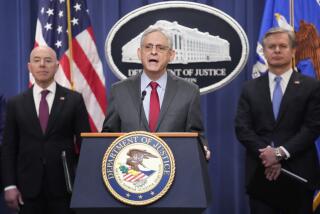U.S. Accuses Iraq Regime of Atrocities Against Foes
WASHINGTON â The Clinton administration on Wednesday accused Iraqi President Saddam Husseinâs secret police of torturing and raping the relatives of opposition leaders as part of a continuing pattern of abuses that began with the invasion of Kuwait a decade ago.
David Scheffer, U.S. ambassador at large for war crimes issues, said Iraqâs effort to âblackmailâ opposition figures is the latest in a series of atrocities that have gone unpunished because the international community has lacked the will to establish a special tribunal like those trying war crimes suspects from Rwanda and the former Yugoslav federation.
Scheffer, appearing at a news conference marking the 10th anniversary of Iraqâs Aug. 2, 1990, invasion of Kuwait, expressed hope that an Iraqi war crimes court will be established within six months.
In the meantime, he said, the U.S. government is establishing dossiers of evidence that could be used by prosecutors in any country to which Iraqi leaders happen to travel.
In the absence of an international tribunal, Scheffer said, the administration is âlooking at various national courts around the world that might be able to exercise such jurisdiction.â Washingtonâs contribution, he said, will be to collect and refine the evidence, starting with documents captured during the 1991 Persian Gulf War.
âThereâs a tremendous amount of evidence,â he said. âThe question is, how do you synthesize it so that itâs truly available and usable by a prosecutor in any particular jurisdiction? You canât just take millions of pages of documents in boxes and dump them, because no prosecutor has the ability or the staffing . . . to actually take that on and run with it. You have to have a more systematic approach, and thatâs what weâre trying to accomplish.â
Officials said the arrest in Britain last year of former Chilean dictator Augusto Pinochet set a precedent for any country to arrest someone accused of an international crime who enters its jurisdiction. Pinochet was eventually released on grounds that he was too sick to stand trial.
Meanwhile, the administration has begun to declassify and translate documents seized from Iraqi troops during the war. Eight documents have been turned over to the Iraq Foundation, a private, anti-Hussein organization, for publication on the Internet.
Scheffer said the files are âthe tip of a very large icebergâ of incriminating records.
The eight documents, posted on the Internet at https://www.iraqfoundation.org, mostly direct Iraqi military units in Kuwait to engage in such acts as destroying houses, preparing to set fire to Kuwaiti oil wells, and detaining or executing certain categories of civilians.
David Welch, assistant secretary of State for international organizations, said the administration is doing all it can to support anti-Hussein forces inside Iraq and elsewhere. But he warned that overt U.S. assistance to opponents inside the country would invite retaliation.
âMost Iraqis, I would bet you, are part of the Iraqi opposition,â Welch said. âThe trouble is, most Iraqis are not able to speak for themselves. We would like to help them in a way that is responsible and does not create undue risks.â
Among those risks is the persecution of relatives of opposition figures, Scheffer said.
âOne of the most recent tactics that Saddam Hussein is using to try to thwart these efforts is blackmail, in the form of torture and sexual assault against the relatives of opposition leaders and military officers, to try to control and terrorize his opponents,â he said.
Welch responded to critics who say economic sanctions, imposed by the U.N. with strong American backing, are hurting Iraqi civilians while failing to undermine Husseinâs regime.
He said the U.N. Security Councilâs oil-for-food program, which allows Iraq to sell petroleum to pay for food and medicine distributed under U.N. supervision, would eliminate most civilian hardship if not for interference from the Baghdad regime.
He said the program operates as intended only in the Kurdish-populated north of the country, where Husseinâs government is unable to exercise control.
âThe people in northern Iraq feel that they never had it so good,â Welch said.
As for the rest of the country, Welch said conditions remain bad because Hussein is manipulating civilian hardship in an attempt âto get sanctions lifted without complianceâ with postwar U.N. resolutions requiring Iraq to dismantle its programs for weapons of mass destruction, release Kuwaiti prisoners and stop persecuting dissidents.
More to Read
Sign up for Essential California
The most important California stories and recommendations in your inbox every morning.
You may occasionally receive promotional content from the Los Angeles Times.










